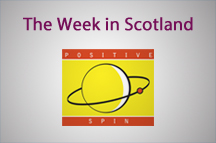 Many of the political stories this week had a sense of déjà vu as topics seemed to rear up from the past while of course the very much present topic of Brexit dominated the Scottish Conservative Conference.
Many of the political stories this week had a sense of déjà vu as topics seemed to rear up from the past while of course the very much present topic of Brexit dominated the Scottish Conservative Conference.
At First Minister’s questions it felt like we were back in the Scottish referendum campaign as oil reserves and revenue for an independent Scotland were the topics with both Ruth Davidson and Kez Dugdale pointing out that the collapse in oil revenue rendered positive revenue predictions obsolete. John Swinney, standing in for Nicola Sturgeon, whilst avoiding the direct question pointed out that oil revenue was never the main source of funding and joked that the opposition leaders were reforming better together. The questions stemmed from revelations that the independence referendum could take place in the autumn of 2018 as by then the Brexit deal would be clearer.
It also seemed we were returning to the old days of grandiose IT schemes going disastrously wrong as it was announced that the attempt by Scottish Police to implement a nationwide IT system had failed. It seems the Scottish Police Authority had not learned from those big failures where too much had been attempted by an overstretched firm. The already beleaguered new Scotland wide force has now lost the promise of massive savings from integrated systems.
 Theresa May was the headliner at the Scottish Conservative conference where she defended the union of the United Kingdom with examples of co-operation. This heralded an announcement of closer working between the devolved administrations and Westminster to allow a more joined up approach to policy. Often policy in the UK is formulated without thought to the consequences in Scotland, so a better working relationship between the administrations may help. However, it may also be seen as a raid on Scottish policy areas and reigning in of devolved powers while additional powers resulting from Brexit could be kept. Indeed, she stated that legislation would not automatically be transferred to Scotland following Brexit, a long way from the Scottish Government position of a separate deal. This perceived threat to devolution seems to have impacted on public opinion as the latest polls show a surge in support for independence with one Friday paper, The National, claiming it was 50/50. Such a showing in the polls, if it continued, would strengthen the SNP resolve to push for a second referendum.
Theresa May was the headliner at the Scottish Conservative conference where she defended the union of the United Kingdom with examples of co-operation. This heralded an announcement of closer working between the devolved administrations and Westminster to allow a more joined up approach to policy. Often policy in the UK is formulated without thought to the consequences in Scotland, so a better working relationship between the administrations may help. However, it may also be seen as a raid on Scottish policy areas and reigning in of devolved powers while additional powers resulting from Brexit could be kept. Indeed, she stated that legislation would not automatically be transferred to Scotland following Brexit, a long way from the Scottish Government position of a separate deal. This perceived threat to devolution seems to have impacted on public opinion as the latest polls show a surge in support for independence with one Friday paper, The National, claiming it was 50/50. Such a showing in the polls, if it continued, would strengthen the SNP resolve to push for a second referendum.
Ruth Davidson used her speech to announce a review of the curriculum of excellence and health. As the bodies charged with overseeing the educational reforms came in for strong criticism from the Scottish Parliament education committee this may seem like a good area in which to attack the Government. However, these reforms were started by the previous coalition administration, so there may be a lack of support from the other parties in attacking the new system. Further tinkering in the curriculum may not go down well with teachers and parents after so much upheaval.
Finally, the budget where the treasury announced an additional £350 million for Scotland while the Scottish Government concentrated on the overall cuts to the budget of £3 billion over ten years.














